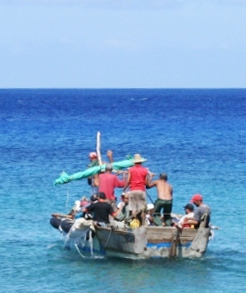Archive for March 10th, 2011

FOI procedures still faulty
 (CNS): In her latest decision Information Commissioner Jennifer Dilbert has revealed further procedural problems with another public authority when it comes to complying with the Freedom of information Law. Although in this her eighth hearing she upheld the public authority’s decision to withhold information, she has once again pointed to a number of problems during the process of the request to the Heath Regulatory Services, as well as poor record keeping. The FOI request was made by an applicant who was seeking information about a third party’s insurance provider but the record was not released by the authority as, it said, it would have divulged personal information.
(CNS): In her latest decision Information Commissioner Jennifer Dilbert has revealed further procedural problems with another public authority when it comes to complying with the Freedom of information Law. Although in this her eighth hearing she upheld the public authority’s decision to withhold information, she has once again pointed to a number of problems during the process of the request to the Heath Regulatory Services, as well as poor record keeping. The FOI request was made by an applicant who was seeking information about a third party’s insurance provider but the record was not released by the authority as, it said, it would have divulged personal information.
The commissioner upheld the decision and stated that, “The responsive record in this matter is exempt from disclosure under section 23(1) of the Freedom of Information Law, 2007 as it would involve the unreasonable disclosure of the personal information of the Third Party. I do not find that there is an overriding public interest in disclosing the record.”
The applicant made the original request in June 2010, asking for “the name of the insurance carrier who provides malpractice coverage” for a named practitioner in the Cayman Islands who the applicant was reportedly seeking to take legal action against as a result of alleged malpractice.
The HRS had exempted the record from release as they had assessed that it contained personal information. Section 23 of the FOI Law requires that a public authority not grant access to a record if it would involve the unreasonable disclosure of personal information. In the hearing following the applicant’s appeal the commissioner had to determine if the information was about an identifiable individual.
“In any situation where the identity of the individual can be ascertained or deduced by the information in the record, that information is personal for the purposes of the FOI Law, unless it is excluded from the definition in the Law,” stated Dilbert, adding that the information in the responsive record “is obviously about, and linked to this individual, in the sense that it provides particular, biographical data about this individual.”
Next Dilbert said she had to examine if it would be unreasonable to disclose the information considering in particular the distinction between a public servant or public authority, and a private individual. In the case at hand, the Third Party was a private practitioner, a fact she said contributed to her final decision.
She also noted that she did not find there to be a case for public interest in its disclosure. “Even if a patient were interested in seeking compensation for alleged malpractice, they would not be entitled to contact a practitioner’s insurer directly and would need to seek a remedy through the courts” said Dilbert.
However, Dilbert disagreed with submissions made by the Third Party that the record itself should not be subject to the FOI Law or that it was vexatious. The commissioner said the document was a record as it was collected by the HRS during their normal course of business. “A regulator must have the right to acquire and hold such documentation as is necessary to carry out its regulatory functions,” Dilbert noted. She also added that the PA had not said the record was vexatious but it was the Third Party that had argued it was and she said it was not “within the purview of a Third Party to make representations as to why a PA should find a request vexatious.”
Despite upholding the HRS’s decisions in this case, Dilbert did still uncover a number of procedural problems and poor record keeping during the hearing in relation to the requirements of the Freedom of information law.
“During the course of this Hearing, it has been brought to my attention that there may be some inadequacies in the record keeping and procedural policies of the HRS, particularly as they relate to files dating back before the creation of the HRS and enactment of the HP Law,” she said.
“In order to ensure that the HRS is able to effectively carry out its vital duty of regulating the provision of health services in the Cayman Islands, I would strongly recommend that these inadequacies be addressed, and that a full audit be conducted on all the documentation held by HRS on currently registered practitioners in the Cayman Islands.”
In her decision she also pointed out that the procedures regarding the involvement of the third party in this case were incorrect and while the HRS had asked for an extension in order to involve themit was still 12 days late in informing the applicant that the FOI had been refused.
She also drew attention to the ambiguity surrounding the internal review which was requested after the FOI was refused.
.
“During the investigation of this appeal, it was not immediately evident if an Internal Review had been conducted,” Dilbert said, but it was discovered that the director of the HRS had been involved in the initial review of this request. The applicant should have been told that an Internal Review was not possible and advised to appeal directly to the Information Commissioner.
“It is critical that the HRS identify and designate the person who will conduct Internal Reviews. This should not be a floating responsibility that is transferred to another person if and when the designated person is involved in the original decision, as this will cause confusion and unduly delay the appeals process,” Dilbert added.
See the commissioner’s 8th decision below.

Cubans opt to come ashore
 (CNS): After well over a year without a single vessel containing Cuban migrants being reported in Cayman waters, the second boat in just over a month was intercepted off the north coast of Grand Cayman today. Department of Immigration officials reported that a Cuban vessel carrying 21 people was spotted by a joint immigration, customs, RCIPS marine unit at around 3pm Thursday afternoon. Deputy Chief Immigration Officer Enforcement Gary Wong said that a couple from the craft decided to come ashore. Police confirmed that the vessel was seaworthy. (Photo by Dennie Warren Jr)
(CNS): After well over a year without a single vessel containing Cuban migrants being reported in Cayman waters, the second boat in just over a month was intercepted off the north coast of Grand Cayman today. Department of Immigration officials reported that a Cuban vessel carrying 21 people was spotted by a joint immigration, customs, RCIPS marine unit at around 3pm Thursday afternoon. Deputy Chief Immigration Officer Enforcement Gary Wong said that a couple from the craft decided to come ashore. Police confirmed that the vessel was seaworthy. (Photo by Dennie Warren Jr)
Meanwhile, the other 19 refugees, including one female, indicated their intention to continue on their journey to Honduras in the boat.
The couple who opted to come ashore were brought to the George Town Barcadere , sources revealed. The husband and wife, both aged 28, are now in custody and being processed by immigration officials before being deported back to Cuba.
, sources revealed. The husband and wife, both aged 28, are now in custody and being processed by immigration officials before being deported back to Cuba.
The vessel, which has continued on its journey, was originally spotted yesterday off the coast of Cayman Brac and is the second boat after some 14 months to be intercepted.
The last vessel stopped by officials was carrying 16 migrants in a 21 foot vessel (pictured right) and those aboard opted to carrying on their journey without assistance from local officials under the terms of the MOU Cayman has with the Cuban Government.

New boss appointed to oversee scholarships
 (CNS): Deirdre Seymour, who previously worked in the trust and corporate world, has been appointed as head of the education department’s Scholarship Secretariat. According to a release from GIS on Thursday, Seymour was officially appointed in January following a competitive recruitment process. The secretariat was recently restructured and there are now three members of staff at the unit tasked with ensuring an appropriate return on investment from those who earn government-sponsored academic scholarships. In June last year the education minister said that scholarship recipients were not being properly monitored and even those who were failing were still receiving government money to remain in college, but that was going to change.
(CNS): Deirdre Seymour, who previously worked in the trust and corporate world, has been appointed as head of the education department’s Scholarship Secretariat. According to a release from GIS on Thursday, Seymour was officially appointed in January following a competitive recruitment process. The secretariat was recently restructured and there are now three members of staff at the unit tasked with ensuring an appropriate return on investment from those who earn government-sponsored academic scholarships. In June last year the education minister said that scholarship recipients were not being properly monitored and even those who were failing were still receiving government money to remain in college, but that was going to change.
He warned that in future the secretariat would be monitoring students on scholarships and those who were not performing would lose their funding. “Students are graduating with degrees that barely make the grade. The government must act decisively and swiftly in order to raise standards,” he said, adding that graduates were finding it difficult to get work because of poor performance in university.
Seymour will be responsible for monitoring and tracking scholarship recipient progress, providing strategic and operational direction for the unit and improving efficiency and effectiveness levels, officials stated.
A former trust and corporate professional, Seymour brings 20 years of customer service and managerial experience to the post. Having also served as both member and chairperson for several home-school and parent-teacher associations and lately for Cayman’s Education Council, she also brings specific education knowledge.
Ministry of Education, Training and Employment Chief Officer Mary Rodrigues said her appointment completed the unit’s redevelopment, as she welcomed Seymour to the Scholarship Secretariat team.
“Because the scholarship programme is so critical to the continued education of our students, we’re really happy to have her on board,” she said. “Already, she’s spearheading the launch of an online scholarship application system and we’re excited about that.”
Falling under the Ministry of Education, Training and Employment, the Scholarship Secretariat currently serves some 1,000 active post-secondary and tertiary education students on overseas and local scholarships as well as on local education grants, mounting to almost $10 million.

Salmonella scare in Skippy peanut butter
 (CNS): A routine sampling undertaken by Unilever has revealed that its product Skippy Reduced Fat Peanut Butter Spread may be contaminated with Salmonella. As a result local supermarket Foster’s Food Fair said it has pulled the related products from its shelves. The voluntary limited recall by Unilever in consultation with the US Food and Drug Administration affects the products with best used dates: from MAY1612LR1 through and including MAY2112LR1 which are stamped on the lid of the jar. Until it receives further correspondence from the manufacture on this affected product, Fosters said the peanut butter would not be available.
(CNS): A routine sampling undertaken by Unilever has revealed that its product Skippy Reduced Fat Peanut Butter Spread may be contaminated with Salmonella. As a result local supermarket Foster’s Food Fair said it has pulled the related products from its shelves. The voluntary limited recall by Unilever in consultation with the US Food and Drug Administration affects the products with best used dates: from MAY1612LR1 through and including MAY2112LR1 which are stamped on the lid of the jar. Until it receives further correspondence from the manufacture on this affected product, Fosters said the peanut butter would not be available.
Apologising for the inconvenience, Fosters said that the safety of customers was its top priority. “We encourage all customers who have purchased this product to return the affected product to their Foster’s Food Fair IGA of purchase for a full refund,” the grocer stated.
Salmonella can cause serious and sometimes fatal infections in young children, frail or elderly people, and others with weakened immune systems. Healthy persons infected with Salmonella often experience fever, diarrhoea (which may be bloody), nausea, vomiting and abdominal pain.
In rare circumstances, infection with Salmonella can result in the organism getting into the bloodstream and producing more severe illnesses such as arterial infections (infected aneurysms), endocarditis and arthritis.
Consumers can contact the company at 1-800-453-3432, which is operational 24 hours a day, for information on the recall. In addition, a consumer services representative is available Monday through Friday between the hours of 8:30am and 6:00pm EST.

Hurricane Hilton happening
 (CNS): Almost half a million dollars has already been spent this year on building material to begin construction of a new emergency facility on Cayman Brac’s Bluff. Ministry of District Administration, Works, Lands & Agriculture Acting Chief Officer Tristan Hydes said that $477,749 (just over half of the $900k in this year’s budget) has been used to purchase materials such as cement and fill, and that the rest of the funds will be spent on consultants as well as the foundation for the main hall of the project. Request for tenders for the 27,000 square foot foundation closed last week and the award, which is being conducted through the Central Tenders Committee, is scheduled around 18 March.
(CNS): Almost half a million dollars has already been spent this year on building material to begin construction of a new emergency facility on Cayman Brac’s Bluff. Ministry of District Administration, Works, Lands & Agriculture Acting Chief Officer Tristan Hydes said that $477,749 (just over half of the $900k in this year’s budget) has been used to purchase materials such as cement and fill, and that the rest of the funds will be spent on consultants as well as the foundation for the main hall of the project. Request for tenders for the 27,000 square foot foundation closed last week and the award, which is being conducted through the Central Tenders Committee, is scheduled around 18 March.
Public Works Department workers are also in the process of preparing the site, located east of the playing field, using their excavator to chip away about 200 feet of an outcrop of the Bluff.
The finished two-story 36,111 square foot building, dubbed locally as the “Hurricane Hilton”, will have a main hall and 80 private rooms with shared bathrooms for each pair of rooms.
Hydes said that the project will be tendered in phases rather than a single tender for the whole building. “All tenders of this magnitude are conducted through CTC,” Hydes said, adding that the first tender for the project was available for viewing on the CTC website (although it still has not appeared online) and that PWD on the Brac had several copies of the documents for distribution. Plans were drawn by PWD architects in Grand Cayman, Hydes stated. “PWD are the lead architects and project managers on this project; however, they have also employed other ‘consultants’ to assist,” he said.
Planning approval for the new hurricane shelter, which has an estimated total cost of $9 million, was given last year by the Cayman Brac and Little Cayman Development Control Board and the Building Control Unit has now issued a foundation permit. Deputy Premier and District Administration Minister Juliana O’Connor Connolly told CNS in July last year that site preparation and purchase of some preliminary resources was achieved with the $500,000 in last year’s budget, and the $900,000 in this year’s budget would almost complete the main hall. The ministry now says the main hall should be completed in the next budget year.
“The ministry is aiming to spend all monies in this year’s budget, including the foundation and some superstructure. We also plan to purchase some plant/building material that is immediately required. It is being undertaken in a phased approach, in an effort to spend the money wisely and to spread the costs over a period of time,” Hydes said.
According to the plans, in phase 1 (the main building) the first storey will include the main hall, plus a sick bay, reception area, kitchen and several bathrooms. The second floor will include the command centre, office and conference room. Phase 2 consists of four 2-storey “wings” to the building, each wing with 10 private rooms on each floor, each room with a semi-private bathroom (one for every two rooms).
“One of the lessons of Paloma was that there were too many needs for one hall,” O’Connor Connolly has previously said. The rooms will have individual temperature control, according to the deputy premier, who noted that during Hurricane Paloma, some people were too hot and some were too cold, and that there was no privacy for the elderly or disabled.
The main hall will accommodate up to 400 people in a storm and each wing will house an additional 100 adults, so the new building adds another 800 shelter spaces to Cayman Brac.
O’Connor-Connolly has said the main hall will also be used for inside sports, such as squash, badminton, netball and basketball, and with the rooms it can accommodate visiting teams and can be used for conferences and retreats.
When there is an emergency, the private rooms will be allocated on a ‘first come, first serve’ basis, though the deputy premier has said that if a major hurricane was approaching they could allocate one wing for hospital patients.
This new emergency shelter will be the fourth on the island. The Aston Rutty Civic Centre on the Bluff can hold approximately 500 people, while the West End Primary School, which has been structurally upgraded since Paloma, can hold 250, and the Brac Day Care Centre, located next to the civic centre, can hold 155.
The District Administration Building, while not an official emergency centre, also shelters DA staff and their families, and the rebuilt Veteran’s and Seaman’s Center is an unofficial shelter. In addition, many new homes are being built on the Bluff, where people remain during a storm, and two new churches on the Bluff that were built to hurricane standards have been recently completed.
Clients financial sector doesn’t want exposed free
(CNS): Access to a data base containing more than 50 million profiles of individuals on the global watch lists if sanctions and enforcement agencies from around the world will be offered free to people attending an offshore conference in Miami next month. The list compiled by MongooseGI FCS, believed to be the largest of its kind in the world, identifies those convicted or accused of terrorism, corruption, narcotics trafficking, fraud, money laundering and other serious financial crimes. The database also provides country risk assessments including a global terrorism heat map.
The firm will be launching the know your customer/global financial compliance solution at the OffshoreAlert Conference an all attendees will receive a 12-month free license to the list which would otherwise cost up to $10,000 per year.
"Our system contains more than 50 million intelligence profiles of individuals, over seven million of which contain a photograph of the profiled person, and 241 country risk-assessments," said MongooseGI executive chairman Alan Tennant Johnson. "It is designed to ensure that banks, fund administrators and other financial services companies and professionals comply with KYC legislation and reduce their overall business risk and exposure to financial penalties and reputational damage."
He said that the data was extracted from more than five million sources which MongooseGI monitors continuously, including watch lists, sanctions, media, corporate and government resources.
“MongooseGI FCS uses complex computational algorithms that automatically aggregate the data into comprehensive profiles in real time eliminating delays and manual data entry errors,” Johnson added. “MongooseGI FCS provides customized reports and integrated workflow to help organizations perform complex risk analytics efficiently and effectively."
Instructions about how to sign up for a 12-month free license to MongooseGI FCS will be given to attendees during The OffshoreAlert Conference, which is being held at The Ritz-Carlton, South Beach in Miami Beach, Florida on April 4-6, 2011.
Minister urges people to get kidneys tested
(CNS): In his message for World Kidney Day (10 March) Health Minister Mark Scotland is urging people in Cayman to take advantage of the day to get their kidney function tested, as he notes there is a high incidence of kidney disease in Cayman. Given the high levels of diabetes in the jurisdiction, the minister said one can draw a straight line from that to wider health problems, including kidney problems. Heart and kidney health are closely linked with high blood pressure, the most common cause of kidney damage, especially when associated with other factors like diabetes.
Minister of Health, Mark Scotland’s full message:
Today, March 10, is World Kidney Day – a good time to offer a few words about kidney health in particular and public health in general, always a critical subject and one which determines the well-being of the people of the Cayman Islands.
It is impossible to say too much about the importance of self-awareness and of taking personal responsibility for your own health — and that of your family. This year’s slogan for World Kidney Day is “Protect Your Kidneys, Save Your Heart”. The connection is no coincidence.
Perhaps the best place to start is to observe that Cayman has a high incidence of kidney disease. That should not, however, come as a surprise when you consider the high incidence of diabetes we have, and you can draw a straight line from that to larger implications for high blood pressure, heart disease, obesity, smoking and other circulatory and respiratory problems — even to diets lacking in fruit and vegetables.
Heart health and kidney health are closely interlinked. High blood pressure is the most common cause of kidney damage, especially when associated with other factors like diabetes, high cholesterol and cardiovascular disease.
If you have kidney disease, your risk of heart disease and premature death is three times higher than those who do not. When your kidneys don’t work properly, waste products accumulate and affect how your heart and blood vessels work. Kidney dysfunction increases the risk of cardiovascular disease, and can lead to a heart attack or stroke and a progressive loss in renal function over a period of months or years.
The strain on the public purse of these chronic conditions is significant, and not just in terms of meeting budgets and providing finance for hospital equipment, staff and treatment, but also in terms of lost production, lost working hours, in both the public and private sector.
I strongly encourage all of us to come together and to keep in mind the wider effects of World Kidney Day for our whole community.
Please, get tested on Thursday. Bring the family. Make it an act of support for the nation’s well-being.
If you cannot make it on Thursday, make an appointment to get tested, whether at the hospital, your District Health Centre or your private physician. It is important you have this discussion, and the test is simple and painless.
Make sure your child’s school takes the free tour of the dialysis ward at the George Town Hospital.
Make sure you obtain, read and understandthe flyers being distributed island-wide describing preventative measures and early detection.
Finally, let me draw attention to the management and staff of the Health Services Authority, who are devoting a lot of important time and effort to World Kidney Day. The numerous public activities — from free screening to school tours of the dialysis unit to an evening lecture programme — are part of efforts to bring home to people the importance of kidney care and some of the things that individuals might do to promote, preserve and protect their own well-being.
Those efforts are being supported by Rotary Central and by the Diabetes Association.
Representatives of the Diabetes Association will attend the free screenings in the foyer of the George Town Hospital on Thursday between 11am and 1:30pm.
They will be there to answer questions, to recommend cautionary efforts and preventive measures, and even treatment options should the screenings indicate a need.
The HSA, Rotary Central and the Diabetes Association are valuable partners in our World Kidney Day efforts and we sincerely thank everyone involved for their support. Now it’s up to all of us to do our part.

Cabinet ignored commission
 (CNS): Two members of the Constitutional Commission have revealed that government ignored its advice when it came to drafting the legislation for the establishment of advisory district councils. Wil Pineau said that the commission had hoped government would have waited for the results of research currently underway that may have helped create more effective councils. His fellow commissioner, Julene Banks, said the commission had envision the councils to be more democratic and shaped more like the existing district council in North Side, where members have been elected by people living in that community. However, Cabinet chose not to consider their input before it went ahead and passed legislation earlier this year.
(CNS): Two members of the Constitutional Commission have revealed that government ignored its advice when it came to drafting the legislation for the establishment of advisory district councils. Wil Pineau said that the commission had hoped government would have waited for the results of research currently underway that may have helped create more effective councils. His fellow commissioner, Julene Banks, said the commission had envision the councils to be more democratic and shaped more like the existing district council in North Side, where members have been elected by people living in that community. However, Cabinet chose not to consider their input before it went ahead and passed legislation earlier this year.
The commissioners were speaking at a press briefing earlier this week, convened to launch the Constitutional Commission’s new website. Pineau and Banks both said that the people needed to know more about the process of government in the Cayman Islands. Pineau stated that people needed the answers to questions, such as how Cabinet was advised, how decisions were made and how policies were arrived at to ensure good governance.
He said the commission was involved in a major research project about the country’s system of governance, which he said he hoped would offer answers to these and many other questions about how Cabinet receives advice and how people access their representatives and voice their opinions.
“We hoped Cabinet would have waited before rushing ahead with advisory district council legislation for some of the results of this research,” Pineau said. “We are doing the research to evaluate how government works and what we have already … We wanted to understand what the role of the councils would be.”
Pineau said the research could have determined whether advice is being duplicated, how costly it all would be and how effective and efficient the system is and where improvements were needed, but he said the government decided to go ahead with the law.
“We don’t agree with what is in place at the moment,” Banks, the commission’s legal expert said, about the Advisory District Council Law 2010.
The premier passed the legislation in January which caused a certain amount of controversy as Cabinet will be appointing the majority of the members of the council, as opposed to allowing town hall style elections, as is the case with the country’s only existing council established by independent MLA Ezzard Miller.
Despite being ignored, the commissioners said their goal was still to make government and governance as transparent as possible and they would be encouraging open dialogue at their forthcoming meetings about the district councils. Banks said they hoped to begin the meetings in North side, where they could see how that existing council was functioning.
The commissioners said that the people had to understand that the representatives of the Legislative Assembly were constitutionally bound to represent the people and the governance research paper would establish how they do this and how well they do it at present.
Banks spoke about the need for a bi-partisan approach in some areas and revealed the concerns of stakeholder groups that the commission has spoken with about how good policies and projects are stopped or even reversed whenever there is a change of government without due consideration. She said that people discuss their concerns and complaints behind closed doors but less so publicly and hoped they would come forward and help find the solutions for better governance.

Illinois abolishes death penalty
 (The Guardian): Illinois has abolished the death penalty after two decades of deliberation on the grounds that the justice system could execute innocent people by mistake, in a move that is likely to renew calls for other US states to follow. The move will save 15 men from execution who are on Illinois’s death row, moving them to life in prison with no hope of parole. Governor Pat Quinn, a Democrat who has long supported capital punishment, spent two months deliberating on the decision, which he described as the most difficult he has made in office. "If the system can’t be guaranteed, 100% error-free, then we shouldn’t have the system," Quinn said.
(The Guardian): Illinois has abolished the death penalty after two decades of deliberation on the grounds that the justice system could execute innocent people by mistake, in a move that is likely to renew calls for other US states to follow. The move will save 15 men from execution who are on Illinois’s death row, moving them to life in prison with no hope of parole. Governor Pat Quinn, a Democrat who has long supported capital punishment, spent two months deliberating on the decision, which he described as the most difficult he has made in office. "If the system can’t be guaranteed, 100% error-free, then we shouldn’t have the system," Quinn said.
Portal opens on Cayman’s Constitution
(CNS): The Constitutional Commission has launched its much anticipated website, which will become the primary tool for educating the wider public about the Cayman Islands Constitution 2009. www.knowyourconstitution.ky will serve as a focal point for promoting what the constitution means for the people and to encourage their participation, which in turn will promote more transparent governance in the country. The website has educational materials for teachers, downloadable copies of the constitution, discussion papers on constitutional matters, as well as legislation and minutes of meetings.
Part of the goal to create openness, transparency, debate discussion and understanding, the website is one of the ways the commissioners hope people will come to familiarise themselves with and understand the country’s constitution and how it can empower them to hold government accountable, said Constitutional Commission Member Wil Pineau.
As well as a portal for facts, resources, the answers to questions, documents and minutes, the website is designed to be an interactive tool and the commissioners want people to submit comments and questions and concerns and for people to post ideas, relevant discussion papers and school projects or lesson plans.
“The constitution belongs to the people of the Cayman Islands so it is critical that everyone understands and protects its provisions,” Pineau said at a briefing to launch the website on Tuesday. “The only way our citizens can carry out this important responsibility is to get involved and to learn the constitution. “
As the commission supports open and transparent public discussion, all of its own reports, discussion documents and minutes are on the site. It also has a list of frequently asked questions but Pineau stated that the commission was hoping to have more submitted from the public.
The website comes ahead of a planned series of meetings beginning in April, when the commissioners will be heading out to meet the people face to face inall six districts to start promoting and educating people about their constitutional rights in partnership with the elected district representatives.
“These public meetings and discussions will allow us to meet residents and to explain our work and to answer any questions about constitutional matters,” Pineau said, adding that the dates and locations would soon be released once they had been confirmed. “People do have another voice via the constitution,” he added.
Education is the Constitutional Commission’s primary purpose and Pineau said the meetings would be interactive and allow people to raise their issues and concerns and address the many misunderstandings about governance in general.
“There is misunderstanding in the community about the constitution and issues of good governance and the areas that need to be enforced,” he said. “When people understand the system of governance then they are empowered and can have their concerns addressed. If they don’t they are at a disadvantage.”